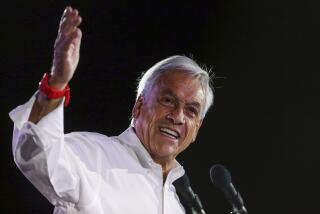F. Belaunde, 89; Served Twice as Peru’s President
- Share via
Former Peruvian President Fernando Belaunde, who was hustled out of office by generals in 1968 and returned to power by a massive majority in elections 12 years later, died Tuesday. He was 89.
Victor Andres Garcia, Belaunde’s nephew, said the former president died of complications from a stroke at a Lima hospital.
A veteran of more than half a century in politics, Belaunde was regarded as a patriarch of democracy in Latin America. He had a reputation for personal honesty that made him an exception to the rule among Peruvian political leaders.
First elected president in 1963, Belaunde was overthrown and exiled in 1968 by Gen. Juan Velasco, who ushered in 12 years of military rule.
During his 10 years in exile, Belaunde worked as a college professor, teaching at Harvard, Columbia, Johns Hopkins and George Washington universities. The experience left him with great admiration for U.S. democracy.
He returned to Peru to win the 1980 presidential election in a landslide, marking the restoration of democratic rule.
Born in Lima on Oct. 7, 1912, Belaunde spent his early years in Paris and the United States after his well-to-do and politically active father was sent into political exile in 1924. He went on to study architecture at the University of Miami and the University of Texas, from which he graduated in 1935.
He helped to found the National Democratic Front in 1943 and in 1956 started the centrist Popular Action party, which he led until his death.
He served in the Chamber of Deputies for one term from 1945 to 1948 and ran unsuccessfully for president twice. President Manuel Prado, his political foe, confined him in 1959 to an island prison, from which he tried to escape by swimming.
Belaunde was succeeded as president by Alan Garcia in 1985, the first time in more than 40 years that one democratically elected Peruvian president handed power to another.
During his two administrations, Belaunde built important highways and major hydroelectric dams and brought electricity to thousands of towns. He also constructed many housing projects in Lima and other cities. But by the end of his second term, Peru faced severe debt and a new urban and rural armed struggle led by the Maoist Shining Path (Sendero Luminoso).
Belaunde wrote several books, among them “The Conquest of Peru by Peruvians,” which laid out his vision of the country and how it should be developed.
He supported the failed 1990 presidential campaign of his close friend, famed novelist Mario Vargas Llosa, who was beaten by an unknown university rector, Alberto Fujimori.
Belaunde condemned Fujimori’s 1992 “self-coup,” in which he suspended the constitution and dissolved Congress and the Supreme Court with military backing.
Belaunde is survived by three children from his first marriage.
More to Read
Sign up for Essential California
The most important California stories and recommendations in your inbox every morning.
You may occasionally receive promotional content from the Los Angeles Times.













